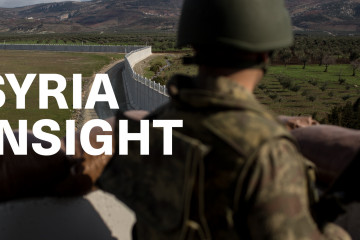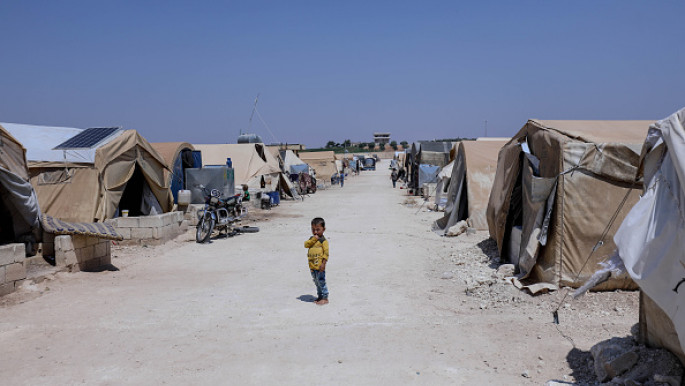

Every six to 12 months, UN Security Council members embark on a frustrating and laborious process to extend a mandate for vital cross-border aid into opposition areas of northwest Syria.
A veto by Russia, something Moscow has consistently threatened, would end the UN Monitoring Mechanism (UNMM) meaning deliveries of humanitarian cargo could not be verified.
This would potentially leave cargo stuck at the Turkish side of the Bab Al-Hawa crossing, the last of four operational border routes into non-regime controlled areas.
The weeks of exhausting negotiations between UN members and Russia leading up to Tuesday's mandate deadline again shredded the nerves of NGO workers, unsure whether the border between Turkey and Syria could be sealed the following day, leaving 4.1 million people in Idlib without access to food and medical supplies.
"To be honest at this point, we have no novel arguments to describe a situation that remains consistently horrible when asked to provide compelling reasons why a humanitarian border should remain open for millions of Syrians that rely on it," Amany Qaddour, Regional Director at Syria Relief & Development, told The New Arab.
"The only thing that can happen is that things will continue to worsen for the people of northwest Syria."
"The humanitarian pool fund is linked to the vote, so projects are being limited to five or six months which is not sustainable, you need to plan moving forward"
Short-term solutions
On Monday, the UNSC took many by surprise by announcing a unanimous agreement to extend the aid lifeline by another six months, but with another vote due in June the cruel pantomime continues.
Despite their relief, NGOs say the six-month mandates, effectively sticking a band-aid on an open wound, are hindering an effective response to Idlib's worsening humanitarian situation.
"The humanitarian pool fund is linked to the vote, so projects are being limited to five or six months which is not sustainable, you need to plan moving forward," said Hazem Rihawi, Senior Programs Manager at the American Relief Coalition for Syria.
Around three-in-four people in northwestern Syria are reliant on aid and the UN and its partners provide assistance to around 2.7 million Syrians there every month, with almost all the supplies entering via the Bab Al-Hawa crossing.
The diplomatic games played by Moscow at the Security Council come as most Syrians see a deterioration in their already miserable living standards, and in northwest Syria, infrastructure and homes have already been ravaged by years of Russian and Syrian regime bombing.
Neighbouring Turkey, home to around 4 million Syrian refugees, is in the midst of a devastating financial crisis, meaning fewer remittances and other assistance to the opposition province.
Most of Syria, manned by Bashar Al-Assad's notorious intelligence services, is going through the worst economic meltdown since Ottoman times, meaning there would be few options for Syrians if the aid route is closed.
|
|
Economic crisis
Farouk Nashar, media & outreach manager at Kesh Malek, said there is strong evidence of a historic deterioration in conditions in Idlib, witnessed by the growing number of people registering for food assistance.
"The situation has also led to an insecure society where the number of crimes is increasing with the growing rates of poverty," said Nashar.
"We are also noticing that the number of children at work is getting higher, meaning they are dropping out of school to help their families with daily expenses."
Syrian NGOs say support from international actors - as Syria enters its 12th year of the war - has been reduced owing to the West's preoccupation with the war in Ukraine, donor fatigue, and general dismay over corruption in some Syrian NGOs.
"Throughout the war, Assad has repeatedly used food as a weapon to starve opposition areas into submission, while aid convoys have been targeted in Russian or regime bombing"
"There is no political solution on the horizon for Syria so donors are hopeless about the situation there," Mazin Albalkhi, an advocacy expert told The New Arab.
Come June, Moscow will likely wave its veto as a political truncheon before the next UNSC vote, which comes as Russia-Western relations worsen owing to the invasion of Ukraine.
Russia's intransigent tactic at the UN appears to be shaped by the belief that with enough resistance, the current cross-border aid will be switched to a crossline mechanism, with reconstruction in regime areas as part of the debate.
Giving in to Russia by allowing Assad to control aid would enable his regime to boost its standing, domestically and internationally, enable him to control the distribution of humanitarian supplies, and help feed his war machine.
This is something the West has generally refused to consider without change by Bashar Al-Assad, but analysts say that Syria is going further down the list of foreign policy priorities in Washington, London, Paris, and other capitals.
Albalkhi believes that some states, already looking to cut aid or divert supplies to Ukraine, could use a Russian veto as the pretext to limit support to Syrians.
"That will have a very negative impact on the Syrian people and might cause a new wave of refugees to Turkey and Europe... if people don't have access to food they will search for other channels to survive," Albalkhi added. Turkey would likely maintain its tough border policy which has seen scores of Syrians shot dead.
|
|
Cross-line aid
The alternative mechanism sought by Russia would see food and medical supplies for Idlib - an opposition territory Assad is seeking to reclaim, and gutted of healthcare facilities by perpetual bombing - enter via Damascus.
This model has already proven disastrous in Kurdish-controlled territories in northeastern Syria, where NGOs and authorities are reliant on the whims of the Assad regime for the distribution of medicine and other aid.
This was seen during the Covic-19 pandemic and the recent cholera outbreak when the northeast was among the hardest-hit regions in the Middle East owing to a lack of medical equipment and drug shortages.
There are also reports of foreign aid being withheld by the regime, diverted to its fighters, who are experiencing their own food shortages, or sold on the black market.
"The diplomatic games played by Moscow at the Security Council come as most Syrians see a deterioration in their already miserable living standards"
NGOs have also complained of the Assad regime taking credit for its food donations or using humanitarian crises as political leverage.
Throughout the war, Assad has repeatedly used food as a weapon to starve opposition areas into submission, while aid convoys have been targeted in Russian or regime bombing.
Rihawi, of the American Relief Coalition for Syria, said these elements mean that cross-border access to Idlib is the only viable way to ensure aid is not politicised.
"There is, of course, the record of human rights violations by the Syrian government, the denial of access to besieged [opposition] areas, but unfortunately people forget, but we don't. It is all recorded, we know what we are dealing with and supporting our theory, only ten cross-line convoy deliveries have been allowed to happen," he told The New Arab.
"Cross-border [aid] is the most effective operation, it is the most scrutinised one, everything is done in a very transparent and accountable way, so why should we shift from cross-border to cross-line if there is no need for that?"
Alternatives
Yet there are other legal routes for aid supplies to reach northern Idlib, avoiding the threat of concurrent hold-ups and bullying by Russia on the Security Council, Ibrahim Olabi and Jack Sproson, barristers at Guernica 37, proposed in an article before the vote.
One such method would be to verify and transfer humanitarian supplies to Idlib via transshipment points inside Turkey, where a Syrian third party would collect and distribute aid from these zones.
"We are actively engaging now to discuss the legality and to show that in the Syrian case, specifically the Syrian case, international law allows an impartial organisation such as the UN to offer aid to all parties in the conflict," Olabi told The New Arab.
"We are not saying the Security Council is wrong... it's a better alternative because we want to depoliticise aid. Aid should not be politicised, it should be solely based on humanitarian need, effectiveness and efficiency."
Come June, it is hoped there should be growing international acceptance for this model, which would frustrate Russian efforts into having Assad appointed as kingmaker for aid in Syria. But for most Syrians, the situation continues to worsen.
Paul McLoughlin is a senior news editor at The New Arab.
Follow him on Twitter: @PaullMcLoughlin





 Follow the Middle East's top stories in English at The New Arab on Google News
Follow the Middle East's top stories in English at The New Arab on Google News


